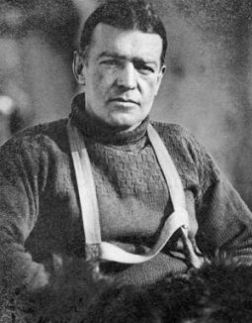In 1914, so the tale goes, the following ad was placed in a London newspaper:

“Men Wanted for Hazardous Journey. Small Wages, bitter cold, long months of complete darkness, constant danger, safe return doubtful. Honour and recognition in case of success.”
It’s still not known whether those words were truly those of Irish explorer Sir Ernest Shackleton or just another urban legend. However, from the nearly five thousand applications he received, Shackleton hired about thirty men for what’s been described as a “successful failure,” and one of the most incredible adventures in the history of exploration.
Over a two year period, Shackleton and his men: survived the wreck of their ship, “Endurance”; survived sub-zero temperatures; and subsisted on a diet of penguins, dogs and seals.
Stranded 1,200 miles from civilization, with no communication and little hope for rescue, Shackleton set out in an ordinary rowboat, traveled over 800 miles across the South Atlantic and ultimately brought every single member of his crew back alive.
What was his secret? Leadership.
Margot Morrell and Stephanie Capparell’s amazing book, “Shackleton’s Way” details the great explorer’s leadership traits. Rereading the book, I became aware of several qualities involving ethical values and principled reasoning.
Honesty: “Shackleton made sure [his] men had a realistic notion of their plight.”
Loyalty: “Shackleton gave his men constant feedback, praising their efforts and correcting their mistakes.”
Caring: “Shackleton related to every person under him as a human being.”
Respect: “Shackleton made sure everyone felt he was doing something worthwhile to get out of the situation.”
Responsibility: “Shackleton worked until the whole job was done.”
An ethical decision-maker determines what must be decided and devises a range of alternatives – “Shackleton observed before he acted; only making changes to make improvements.”
An ethical decision-maker monitors the effects of their decisions and is willing to take a different course of action, based on new information – “Shackleton wasn’t afraid to change his mind as often as the situation dictated.”
The book compares Shackleton’s crisis with that of another well-known “successful failure,” Apollo 13. After the explosion of an oxygen tank, the crew of three astronauts was 200,000 miles from home, their safe return was far from certain. During their four-day struggle to survive, they had to endure freezing temperatures with little food and water.
Before his mission, Captain James Lovell had read about Shackleton’s “miraculous leadership.”
“In Apollo 13 there was no panic,” Lovell wrote. “No one swore, we all just went to work on what went wrong and how to get this thing back.”
In both crises, crewmembers were sustained by the trust and confidence they had in their leaders.
If ever we needed that kind of leadership, it is now.
Comments









